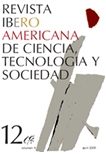The university-socioeconomic environment relationships in the Ibero-American Knowledge Space
DOI:
https://doi.org/10.52712/issn.1850-0013-893Keywords:
university-industry relationships, knowledge transfer, knowledge society, university, networks, management, interface structuresAbstract
This article describes the initiative that is being undertaken, in the framework of the Ibero- American Knowledge Space, to promote knowledge within Latin American universities. This is a direct result of the Ibero-American Network that is being developed to train University-Industry Relationships managers. This article reviews the evolution of the social role of the universities in general, and of the Ibero-American universities in particular, with regard to their involvement in the socio-economic development of their countries and regions. It also describes the needs for new instruments and structures, and therefore for new professionals capable of managing the new instruments of collaboration with socio-economic agents, a need that justifies the initiative described above.
Downloads
References
AROCENA, R. y SUTZ, J. (2005): “Latin American Universities: From an original revolution to an uncertain transition”. Higher Education, vol. 5, pp. 573-592.
BUSH, V. (1945): “Science, the Endless Frontier. A Report to the President”, Traducción en Revista de estudios sociales de la ciencia, en REDES 14, (1999): Ciencia, la frontera sin fin, Buenos Aires, pp. 89-136.
CASTRO, E. y FERNÁNDEZ DE LUCIO, I. (1991): “Hacia un Sistema integrado Ciencia-Tecnología-Industria”, Actas del Simposium International New Tecnologies and Socieconomic Challenge, Institut Catalá d’Estudis Mediterranis, Barcelona, pp. 315-324.
ETZKOWITZ, H. (1990): “The Second Academic Revolution: The Role of the Research University in Economic Development”, en COZZENS, S., HEALEY, RIP, A. y ZIMAN, J. (Eds.): The Research System in Transition, Kluwer Academic Publishers, Boston, pp. 109-124.
FERNÁNDEZ, I.; CASTRO, E.; CONESA, F. y GUTIERREZ, A. (2000): “Las relaciones universidad-empresa: entre la transferencia de resultados y el aprendizaje regional”, Revista Espacios, vol. 21, pp. 127-147.
GEUNA, A. (1999): The Economics of Knowledge Production. Funding and the Structure of University Research. Cheltenham, Edward Elgar.
GIBBONS, M.; LIMOGES, C.; NOWOTNY, H.; SCHWARTZMAN, S. y TROW, M.(1994): The new production of knowledge. The dynamics of science and research in contemporary societies, Sage, Londres.
KLINE, S. J. y ROSENBERG, N. (1986): “An overview of Innovation”, en R. Landau R. y Rosenberg, N. (eds.): The positive Sum Strategy. Harnessing Technology for economic growth, The National Academy Press, Washington DC.
MARTIN, B. R. (2003): “The changing social contract for science and the evolution of the university”, en GEUNA, A.; SALTER, A.; STEINMUELLER, J. y EDWARD, D.(eds.): Science and Innovation: Rethinking the rationales for funding and governance, Cheltenham, Edward Elgar, pp. 7-29.
MOLAS-GALLART, J.; SALTER, A.; PATEL, P.; SCOTT, A. y DURAN, X. (2002): Measuring Third Stream Activities. Final Report to the Russell Group of Universities. Science and Technology Policy Research (SPRU), University of Sussex. Birmingham.
NOWOTNY, H.; SCOTT, P. y GIBBONS, M. (2003): “Mode 2 revisited: The new production of knowledge”, Minerva, vol. 41, pp. 179-194.
OEI (2006): “Espacio Iberoamericano del Conocimiento”. Web: http://www.oei.es/espacioiberoamericano.htm
ROSENBERG, N. (1982). Inside the black box: technology and economics, Cambridge University press, Cambridge.
THOMAS, H.; DAVYT, A. y DAGNINO, R. (1997): “Racionalidades de la interacción Universidad-empresa en América Latina (1955-1995)”. Revista Espacios, vol. 18.
TUUNAINEN, J. (2005): “Hybrid practices? Contributions to the debate on the mutation of science and university”, Higher Education, vol. 50, pp. 275-298.
VEGA JURADO, J.; FERNÁNDEZ DE LUCIO, I. y HUANCA, R. (2008): “University-industry relations in Bolivia: implications for university transformations in Latin America”, Higher Education, vol. 56, pp.205-220.
Downloads
Published
How to Cite
Issue
Section
License
Copyright (c) 2025 CC Attribution 4.0

This work is licensed under a Creative Commons Attribution 4.0 International License.
All CTS's issues and academic articles are under a CC-BY license.
Since 2007, CTS has provided open and free access to all its contents, including the complete archive of its quarterly edition and the different products presented in its electronic platform. This decision is based on the belief that offering free access to published materials helps to build a greater and better exchange of knowledge.
In turn, for the quarterly edition, CTS allows institutional and thematic repositories, as well as personal web pages, to self-archive articles in their post-print or editorial version, immediately after the publication of the final version of each issue and under the condition that a link to the original source will be incorporated into the self-archive.











